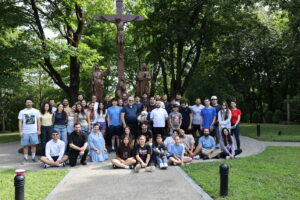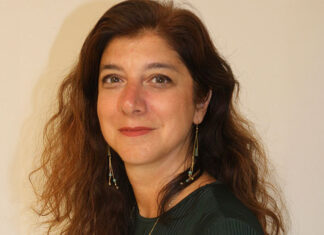lt’s hard not to fall in love with Nadia Owusu after reading her 2021 tell-all memoir, Aftershocks. The daughter of a Ghanaian father and an Armenian mother, Owusu grew up in Rome and in different African cities, including Dar es Salaam, Kampala and Addis Ababa. She also attended boarding school in England for a spell. ln Aftershocks her mother, the daughter of Armenian Genocide survivors, cannot form lasting emotional attachments and abandons her family. She then moves to Watertown, Mass., where she remarries and starts a new life with her second husband. Owusu surmises this to be at least partly the result of epigenetic trauma transmission, since her maternal grandmother was abandoned several times during a long deportation march away from her hometown of Marash.
Owusu’s father brings up Nadia and her sister, and also remarries. Several years later when Nadia is but 14 years old, he succumbs to cancer, leaving her and her sister at the mercy of Anabel, their religious and disciplinarian stepmother. Her father’s death sends Nadia into an emotional tailspin: until then he was her entire world. Yet the young Nadia soldiers on. She is both beautiful and brilliant. She aces all her courses (except math!) at various international schools, drinks, smokes and otherwise acts naughty at every turn.
Several years later while studying at Pace University in New York City she meets Anabel for dinner in a Chinese restaurant. They quibble and Anabel makes a shocking announcement that speeds up Nadia’s hitherto slow descent into madness. Medication doesn’t help much as she spends entire days rocking back and forth in a blue chair that she finds in the street.
But Aftershocks is much more than a simple memoir of a girl gone mad. Owusu sprinkles her text with key episodes in Ghanaian, Ethiopian and Tanzanian history that curious readers stateside will welcome, given the dearth of African history lessons in most school curricula. Though Owusu spends more time describing her paternal heritage, Armenians will identify with the trauma that the Genocide caused its victims and their descendants. As for the book’s title, it applies to her mother abandoning her, to the aftershock of her father’s death, and to the Armenian Genocide as well.
Owusu’s writing style is spontaneous and spunky, often using short declaratives to get across a point or surprise the reader, or to alternatively deliver new or surprising information: “Here on earth Tanzanians believe in hard work, in long days swinging machetes in banana fields picking corn, and digging up beetroots from dirt. They believe in Dolly Parton. And long before Francis learned the lyrics to Jolene and songs sung by George Strait, Willie Nelson, and Johnny Cash he believed in cowboys.”
Some of Owusu’s turns-of-phrase border on the truly elegant: “When l was seven my mother showed up with an earthquake and red balloons. l remember her shaking hands and I remember the shaking earth. ln me, private and seismic tremors cannot be separated.”








